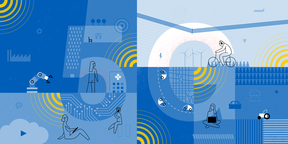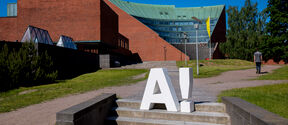More speed for the research of robotic transportation and the Internet of Things – The 5G network has opened in Otaniemi

A 5G wireless network with unprecedented speed and almost no latency will revolutionise transportation, industry, communications and entertainment over the coming decade. It will play a key role in many new technologies such as robotic transportation, industrial automation, the Internet of Things and various augmented reality applications.
One of the largest non-commercial 5G networks in Europe has now been opened at Aalto University's Otaniemi campus, making it possible for researchers, students and companies to develop devices and applications for both consumers and industrial users alike. The network will also cover the campus’ surrounding areas.

Last year, the Finnish Transport and Communications Agency granted Aalto University a three-year radio permit for 5G research, product development and teaching.
Professor Raimo Kantola, who studies 5G information security, says, ‘On an international scale, this is a unique research platform for new wireless networks, applications and services. With our own frequency permit, we can use our 5G network freely with different research and business partners. The network will also be accessible to the Otaniemi-based start-ups’.
‘Aalto University conducts multidisciplinary 5G research, ranging from network technology and signal processing through to applications utilising 5G, such as autonomous transportation and industrial systems. According to international rankings, our telecommunications research is among the very best in Europe’ adds Jyri Hämäläinen, Dean of the School of Electrical Engineering.
Thus far, 5G technology has been developed specifically for the consumer market, so to meet industrial needs, the technology still needs further research and development.
‘5G has not developed enough yet for use in applications that demand extreme reliability such as for healthcare, transport and industrial purposes. Our research environment allows us to develop and test network and software technology to fulfil this requirement’ says Kantola.

The 5G network in Otaniemi has been implemented in cooperation with Nokia, and it includes components supplied by Ericsson and open-source components. MediaTek has contributed devices for testing the network.
Each research user can be assigned a specific piece of the network which allows the network to be used flexibly in multiple parallel studies without any interference.
Among the first research projects to utilise the network are the EU project 5G-MOBIX which studies autonomous driving, the EU project PriMO 5G which investigates the use of drones in rescue operations, and the VIIMA project funded by Business Finland, which develops industrial internet applications such as smart grids.
More information
5G radio permit for Otaniemi
Europe’s top university-based 5G testing and experimental network will accelerate research in the field.

Read more news

NASA Reveals New Details About Dark Matter’s Influence on the Universe
With the Webb telescope’s unprecedented sensitivity, scientists are learning more about dark matter’s influence on stars, galaxies, and even planets like Earth.
Visit the electrical engineering laboratories in spring 2026
Welcome to visit the Robotics Lab, the Acoustics Lab, the Electronics-ICT laboratory, and the ePowerHub laboratory!
The modernization of fluorescent tubes into LED has begun
The lighting change project has started.






